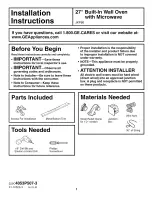
16
6.
Touch START.
The start time is automatically calculated and displayed.
“DELAY” and the stop time will also appear on the oven
display.
When the start time is reached, the oven will automatically
turn on. The minute time countdown will appear on the oven
display.
When the stop time is reached, the oven will shut off
automatically and “cooking complete” will appear on the
oven display.
If enabled, end-of-cycle tones will sound, then reminder
tones will sound every minute.
7.
Touch OFF, or open the oven door to clear the display and/or
stop reminder tones.
Dehydrating
(on convection models, closed door)
Dehydration is a method used to preserve food. Various factors,
such as the quality of the fresh food, pretreatment techniques,
the size and thickness of the food, and the climate may affect the
finished product.
During dehydration, heat is used to force out moisture and air
circulation is used to carry the moisture away.
Refer to a reliable book or source for complete information about
dehydrating and preserving foods.
To Dehydrate:
Position the racks according to the following chart. See
“Positioning Racks and Bakeware” section for diagram.
1.
Close the oven door.
2.
Touch OPTIONS then 5.
3.
Touch the number key to enter a temperature other than
140°F (60°C). The dehydrating range can be set between
100°F and 200°F (38°C and 93°C).
4.
Touch START.
5.
Touch OFF when finished dehydrating.
NOTE:
The oven will automatically turn off after 12 hours.
However, some foods may take more than 12 hours to dehydrate.
If this is the case, the oven will need to be restarted.
OVEN CARE
Self-Cleaning Cycle
IMPORTANT:
The health of some birds is extremely sensitive to
the fumes given off during the Self-Cleaning cycle. Exposure to
the fumes may result in death to certain birds. Always move birds
to another closed and well-ventilated room.
Self-clean the oven before it becomes heavily soiled. Heavy soil
results in longer cleaning and more smoke.
Keep the kitchen well-ventilated during the Self-Cleaning cycle to
help get rid of heat, odors, and smoke.
Do not block the oven vent(s) during the Self-Cleaning cycle. Air
must be able to move freely. Depending on your model, see
“Oven Vent” or “Oven Vents” section.
Do not clean, rub, damage or move the oven door gasket. The
door gasket is essential for a good seal.
Prepare Oven:
■
Remove the broiler pan, grid, cookware and bakeware and,
on some models, the temperature probe from the oven.
Remove oven racks to keep them shiny and easy to slide.
See “General Cleaning” section for more information.
■
Remove any foil from the oven because it may burn or melt,
damaging the oven.
■
Hand clean inside door edge and the 1½" (3.8 cm) area
around the inside oven cavity frame, being certain not to
move or bend the gasket. This area does not get hot enough
during self-cleaning to remove soil. Do not let water, cleaner,
etc. enter slots on door frame. Use a damp cloth to clean this
area.
■
Wipe out any loose soil to reduce smoke and avoid damage.
At high temperatures, foods react with porcelain. Staining,
etching, pitting or faint white spots can result. This will not
affect cooking performance.
How the Cycle Works
IMPORTANT:
The heating and cooling of porcelain on steel in the
oven may result in discoloring, loss of gloss, hairline cracks and
popping sounds.
The Self-Cleaning cycle uses very high temperatures, burning soil
to a powdery ash.
The oven is preset for a 3
hour 30 minute clean cycle, however
the time can be changed. Suggested clean times are 2 hours
30 minutes for light soil and between 3
hours 30 minutes and
4 hours 30 minutes for average to heavy soil.
NUMBER OF RACKS
RACK POSITION(S)
1
3
2
2 and 4
3
1, 3 and 5
WARNING
Burn Hazard
Do not touch the oven during the Self-Cleaning cycle.
Keep children away from oven during
Self-Cleaning cycle.
Failure to follow these instructions can result in burns.
















































